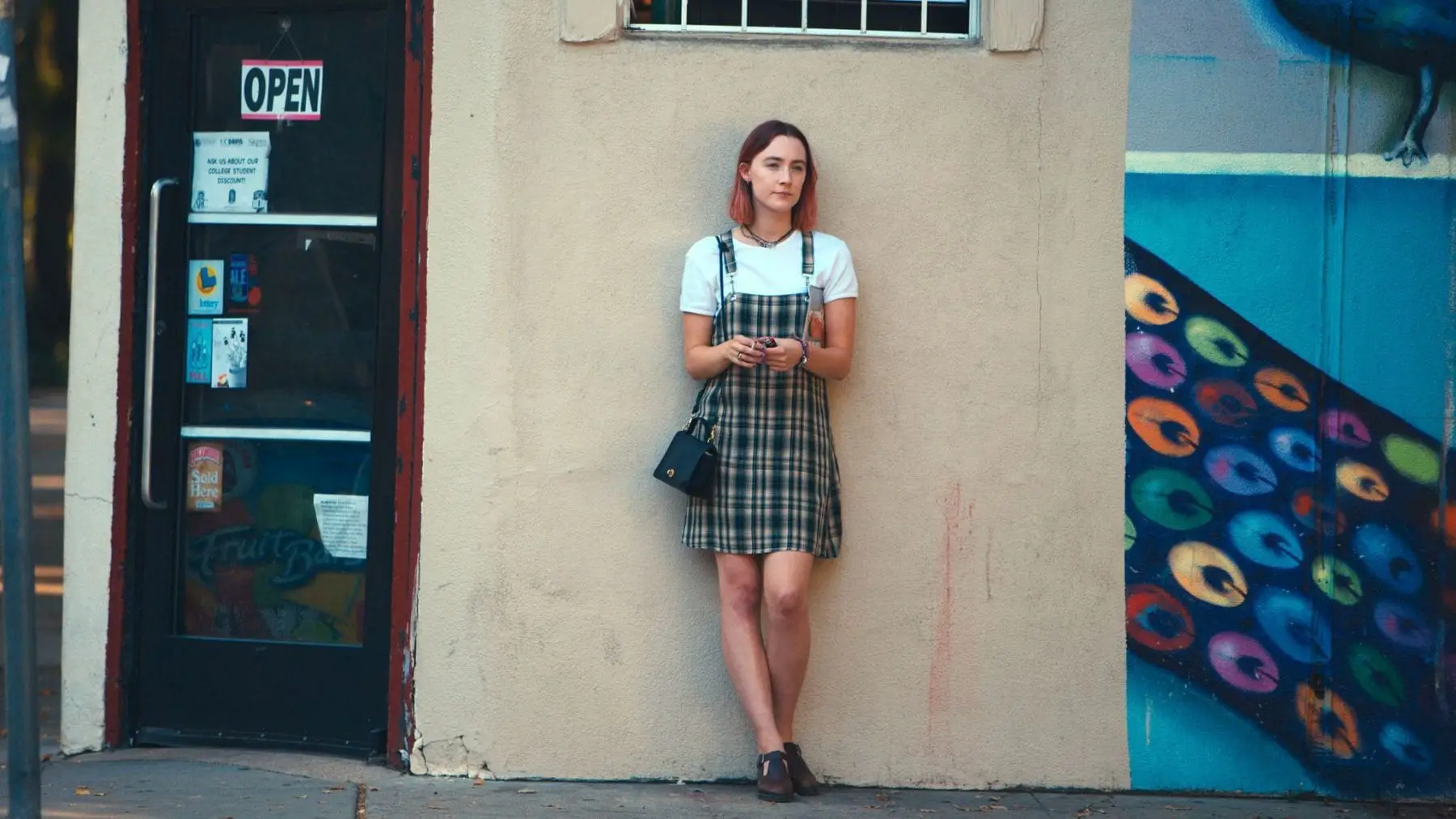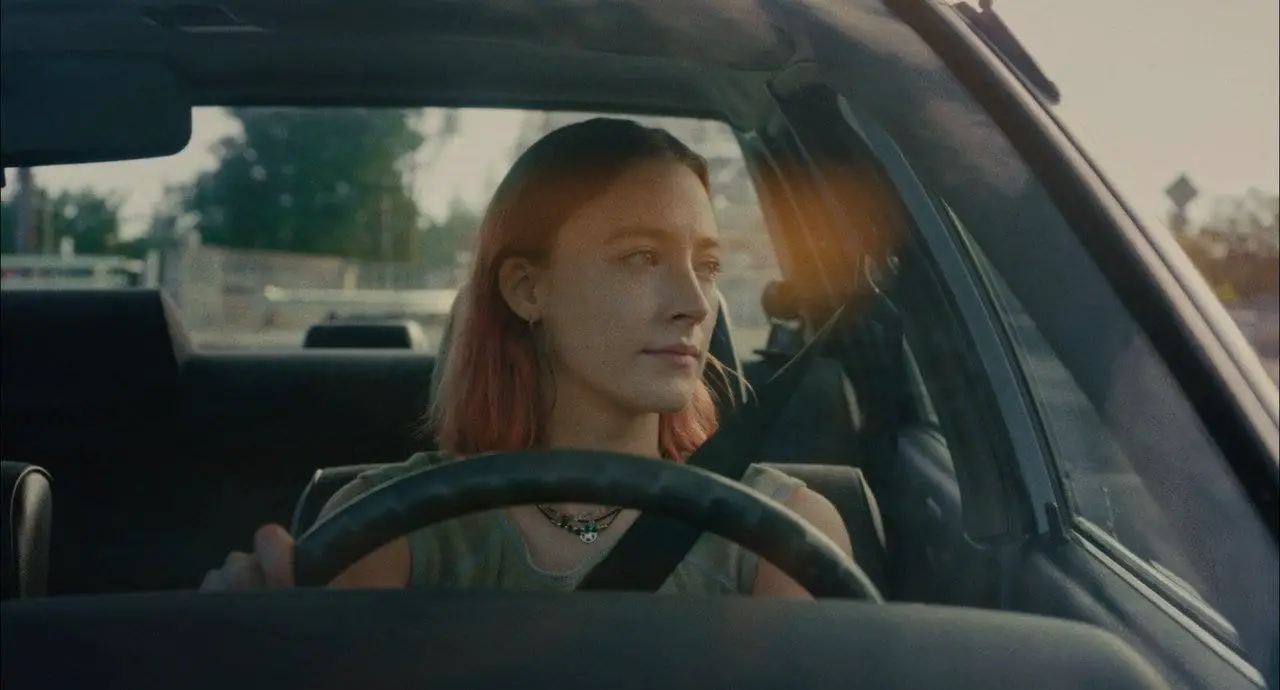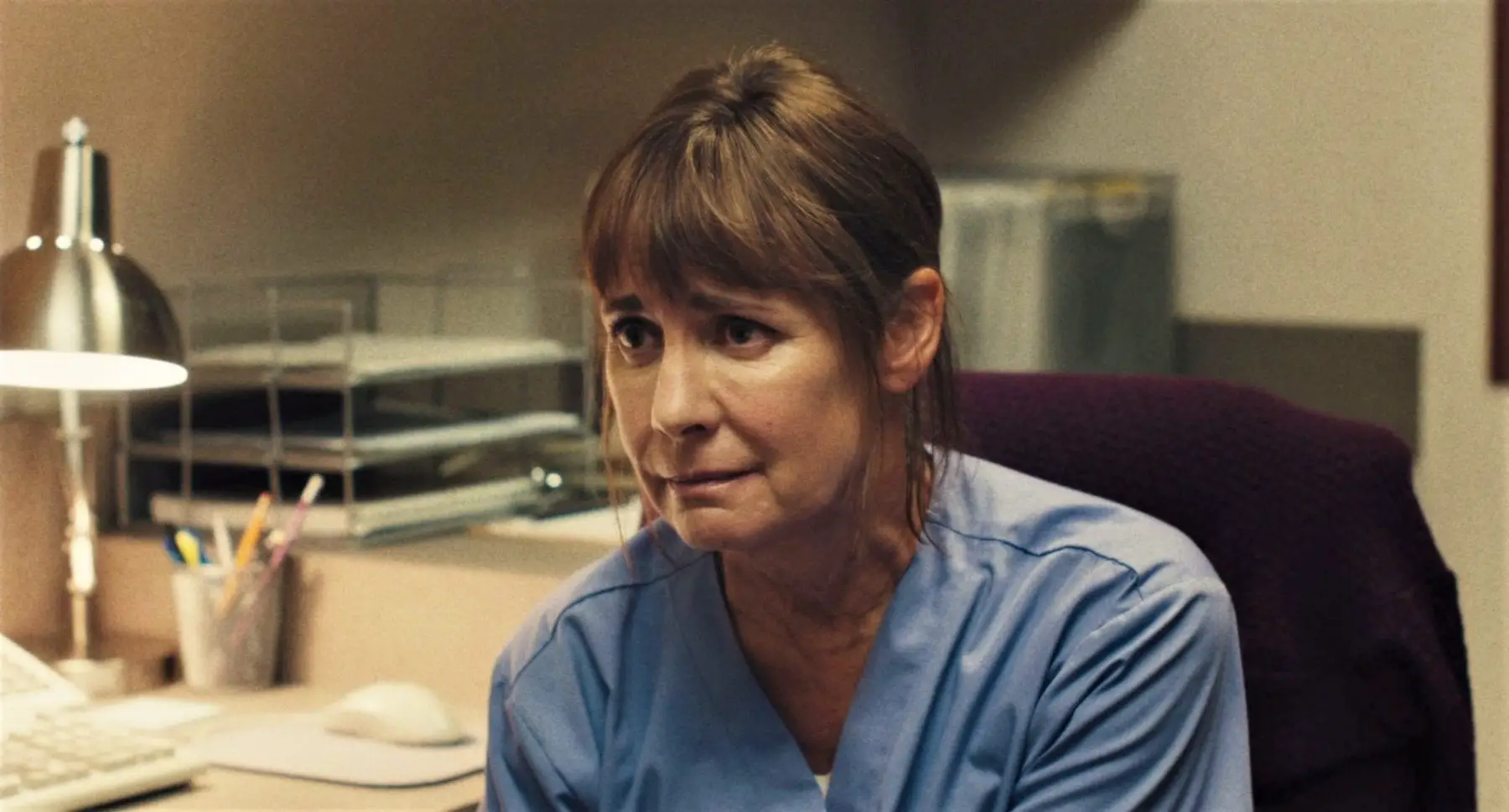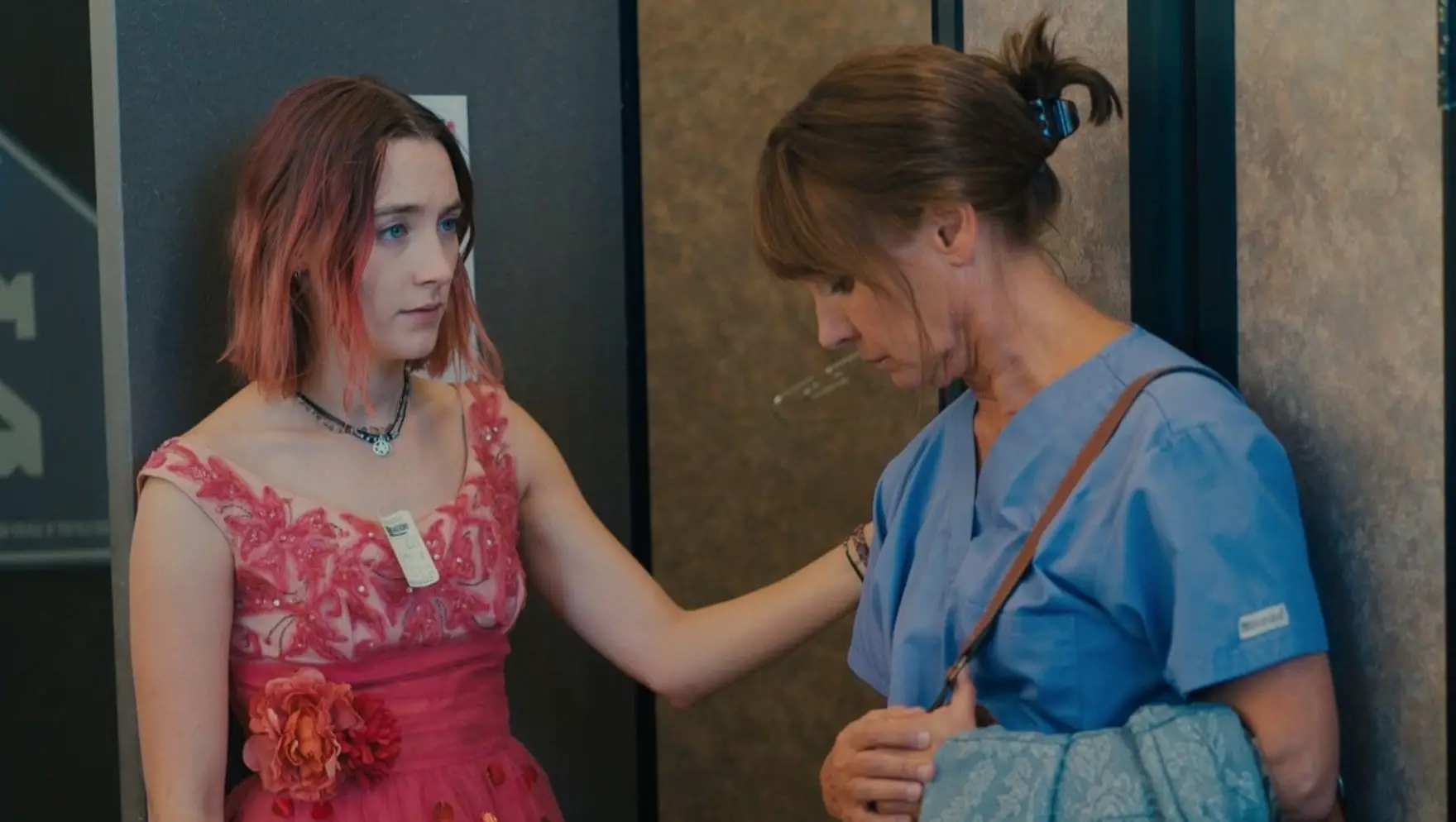I first saw Lady Bird around Oscar time in 2018. The Academy had nominated it for Best Picture of 2017. I would see four other Best Picture nominees that day. Some I loved (Darkest Hour), some I didn’t (Call Me By Your Name), but all had their moments (well, okay, Call Me By Your Name didn’t but that’s a review for another time). Lady Bird was at the top of my list by the end of that fun but exhausting day of watching movies in the dark.
I love Lady Bird, and I picked it for this month-long celebration of women for six reasons:
- Its uniquely told story about a teenage girl approaching the end of her adolescences as she looks toward her future.
- Its personally and emotionally complicated story about the tumultuous relationship between a stubborn teenager and her even more stubborn mother.
- Greta Gerwig
- Saoirse Ronan
- Laurie Metcalf
- Laurie “Fricken” Metcalf
Lady Bird follows Christine “Lady Bird” McPherson (played by Saoirse Ronan) as she navigates her senior year of high school in 2002 Sacramento. She tries new things: high school theater and hangs out with new people, fellow theater participant and quick-to-be boyfriend Danny (Lucas Hedges), popular but vain Jenna (Odeya Rush), and dark, handsome and pretentious Kyle (Timothée Chalamet). She grows distant from her best friend Julie (Beanie Feldstein) after her relationships grow with Jenna and Kyle, and struggles to succeed enough in school to impress out-of-state colleges in cities “with culture.” Lady Bird hates being from Sacramento. She hates living in Sacramento. But her attempts to escape are met with apprehension from her loving but pushy mother, Marion (Laurie Metcalf), whom Lady Bird is constantly arguing bitterly with over college, money and future prospects while her dad (Tracy Letts) and brother (Jordan Rodrigues) are caught in the crossfire.

Greta Gerwig spent years writing Lady Bird‘s screenplay. It was semi-autobiographical, but Gerwig has stressed that none of the movie’s events literally happened to her. Instead “it has a core of truth that resonates with what” she knows. Still, there are some noticeable similarities: the film’s Sacramento setting—Gerwig is a Sacramento native, Lady Bird’s mother is a nurse—Gerwig’s was a nurse and Lady Bird’s birth name being Christine, the same as Gerwig’s mother.
This was Gerwig’s solo-directional debut after co-directing 2008’s Nights and Weekends. Gerwig hasn’t fully developed her directorial voice yet, but she certainly has one. Without needing to say a word herself, Gerwig makes a strong statement about her style and the types of films she’s going to make for at least the foreseeable future: complex, intimate stories about people, families and relationships shot beautifully but simply.
Gerwig said she wanted the film to feel like a memory. And it does. It’s minimalist in the same way that when we think back on our childhood we can’t remember all the details. Gerwig romanticizes with beautiful, Hollywood close-ups and angles of Lady Bird and Danny that function like nostalgia. It’s a little dreamlike in places just like how reminiscing can make memories from long ago almost feel like fantasies devised by our sleeping minds. Gerwig plunges us into Lady Bird’s consciousness as the title character recollects her final year of high school.

But while Gerwig shoots this all very well and gives the audience something nice to look at, she never loses sight of what’s important: the characters. The characters may be full of it sometimes but they themselves are never bullcrap. And I mean never. What they say, do, and go through is as true to real life as I think is possible. That never happens when I watch a movie. There’s always at least something that doesn’t ring true. Part of the brilliance of Gerwig’s script is that she avoids all that with smart, honest writing that’s never in your face or pretentious about itself.
But what sells it all are the two leads. I love Saoirse Ronan. She’s probably my favorite actress working today. She’s seemingly endlessly versatile, and she excels at playing strong characters. Like many others, I grew up watching Laurie Metcalf on Roseanne. Except for her small supporting role in the critically acclaimed (by me anyway) Uncle Buck (1989), that’s pretty much all I knew her from. She was solid in that, but her performance was nothing amazing for me. It was silly and, at times, over-the-top. Her latest celebrated forays on stage and small-screen unseen by me, I didn’t realize the extent of her skill and nuance until I saw Lady Bird.
Lady Bird is frustrating, pretentious, selfish, sometimes brash, and more than a little pigheaded, and I love the hell out of her.
Marion is bossy, overly-strict, unreasonably harsh, short-tempered, and quite obstinate, and I sympathize with her almost every step of the way.
I feel that way about them because Lady Bird is also loving, supportive, creative and big-hearted, while her mother is comforting, protective and caring. They’re complicated. They’re real people. You love them one moment. You’re infuriated with them the next. Marion consoles an upset Lady Bird by embracing her and taking her out on one of their favorite activities: touring homes for sale. Later in the movie, an angry Marion argues with Lady Bird. Marion says the teenager doesn’t appreciate what she has, and she’s throwing away the opportunities her parents create for her and the money they’ve spent raising her:
Lady Bird: You give me a number for how much it costs to raise me, and I’m going to get older and make a lot of money and write you a check for what I owe so that I never have to speak to you again.
Marion: Well, I highly doubt that you will be able to get a job good enough to do that.

There’s been a lot of debate about whether Marion is a good parent or not. A lot of post-movie discussion can stem from it, and that’s wonderful. Any movie that gets people talking deeply about characters (and in this case parenting) is doing something right.
Personally, I think Marion means well, but takes things out on Lady Bird too often. She needs to sit down with her daughter so they can truly listen to one another and work out their problems. Alternatively, my wife thought Marion was emotionally abusive and there’s truth to that as well. But there are also people who’d disagree with both those points of view. The great thing about Marion’s character is there’s no one answer to who she is, which is true of any real person.
Ronan is great as always, but the highlight of the film is Metcalf. She is sooo good, guys. I mean, really, really good. I bolded, italicized and underlined “sooo” and everything. Actors disappearing into their roles is bandied about a lot, but it’s undeniably the case here. It’s like Gerwig found an actual working class nurse and just plopped her into the movie.

The characters and Gerwig’s no bull writing that avoids the normal Hollywood trappings and easy ways out brings life to tired themes of belonging and aspiring to greater heights than those around you. Like Marion says, Lady Bird is never satisfied with what she has, she always wants more. She wants to escape to New York City or some such place to experience, achieve and succeed. Lady Bird also wants more out of her high school relationships and status, hence her pursuing Jenna and Kyle.
What I like about this is Lady Bird wants friends, romantic relationships and success but runs after them without fully thinking them through. She doesn’t realize what or who she really wants. Along the way, she inadvertently damages relationships, screws up and learns. She’s fallible and relatable. Gerwig skips the melodrama too often seen in these types of teenage stories and goes straight for the truth of the unhappiness that comes with such rash decisions that distance people from all that they know.
The mother/daughter relationship explores fresher ideas of recognizing and appreciating where and who you came from and the sacrifices our parents make for us. Unfortunately, our parent’s idea of what we should be doesn’t always match up with ours. They can simultaneously think too little and too much of us. We grow bitter and resentful and endeavor to prove them wrong as we wonder if we’ll ever be good enough for them. At the movie’s heart, Gerwig sincerely captures a mother and daughter relationship full of love, friction, misunderstanding and, ultimately, understanding.

I was never bored by the former themes, but I was drawn in by the latter ideas and got the most emotionally invested in them.
But my most important takeaway from Lady Bird is this is why we (studios and audiences) need to give more women filmmakers a shot. This is why new and unique voices are so important in cinema. Here we have a budding director with stories to tell and things to say like no one else. Gerwig is adding her own flavor and taste to cinema and initiating conversations about people and family dynamics. She’s helping us better understand ourselves. And she’s doing so intelligently and honestly.




